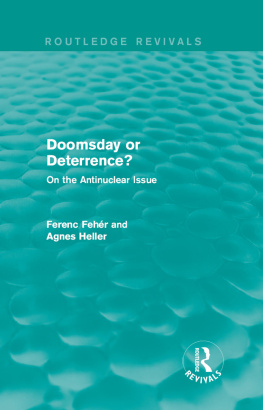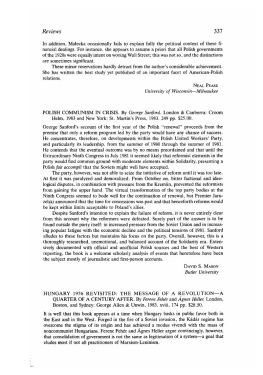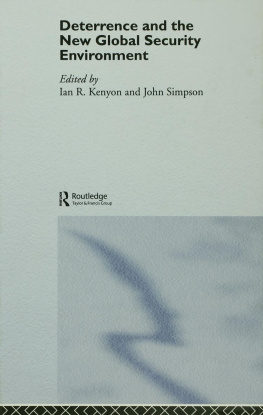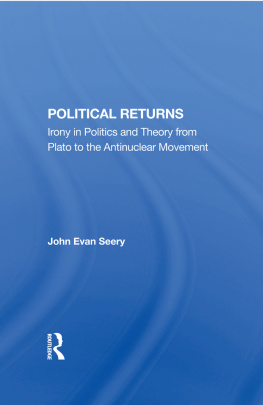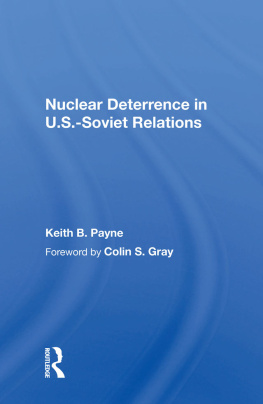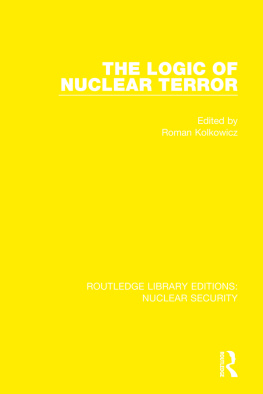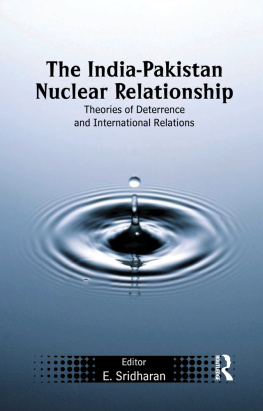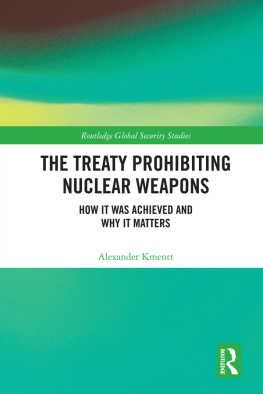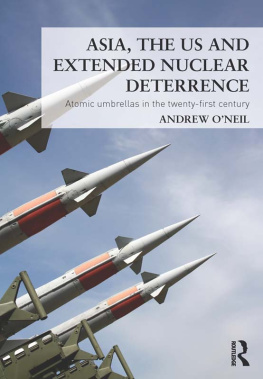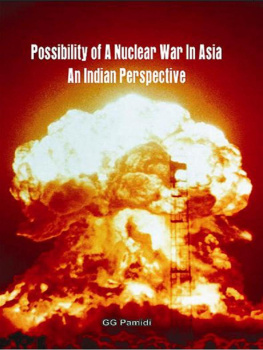Routledge Revivals
Doomsday or Deterrence?
Doomsday or Deterrence? argues against the majority of premises and conclusions of the antinuclear argument as existed in 1986 when this study was first published. Fehr and Hellers study claims that social changes are important to curb technology trends that lean toward the construction of nuclear weapons, as well as using the West as its own value that needs to be defended and emphasising the importance of understanding the true feelings behind the antinuclear argument. This title will be of interest to students of politics and international relations.
Doomsday or Deterrence?
On the Antinuclear Issue
Ferenc Fehr and Agnes Heller
First published in 1986
by M.E. Sharpe, Inc.
This edition first published in 2016 by Routledge
2 Park Square, Milton Park, Abingdon, Oxon, OX14 4RN and by Routledge
711 Third Avenue, New York, NY 10017
Routledge is an imprint of the Taylor & Francis Group, an informa business
1986 M.E. Sharpe, Inc.
All rights reserved. No part of this book may be reprinted or reproduced or utilised in any form or by any electronic, mechanical, or other means, now known or hereafter invented, including photocopying and recording, or in any information storage or retrieval system, without permission in writing from the publishers.
Publishers Note
The publisher has gone to great lengths to ensure the quality of this reprint but points out that some imperfections in the original copies may be apparent.
Disclaimer
The publisher has made every effort to trace copyright holders and welcomes correspondence from those they have been unable to contact.
A Library of Congress record exists under LC control number: 86010074
ISBN 13: 978-1-138-65218-7 (hbk)
ISBN 13: 978-1-315-62437-2 (ebk)
DOOMSDAY OR DETERRENCE?
ON THE ANTINUCLEAR ISSUE
FERENC FEHR
and
AGNES HELLER
Copyright 1986 by M. E. Sharpe, Inc.
80 Business Park Drive, Armonk, New York 10504
All rights reserved. No part of this book may be reproduced in any form without written permission from the publisher.
Available in the United Kingdom and Europe from M. E. Sharpe, Publishers, 3 Henrietta Street, London WC2E 8LU.
Published simultaneously as Vol. XVI, No. 1-2, of International Journal of Politics
Library of Congress Cataloging in Publication Data
Fehr, Ferenc, 1933-
Doomsday or deterrence
1. Nuclear disarmament. 2. Antinuclear movement.
I. Heller, Agnes. II. Title.
JX1974.7.F38 1986 327.174 86-10074
ISBN 0-87332-368-8
ISBN 0-87332-369-6 (pbk.)
Printed in the United States of America
Contents
DOOMSDAY OR DETERRENCE?
Doomsday or Deterrence is a philosophico-political argument against the majority of the premises and conclusions of the current antinuclear movement and is intended as a contribution to an alternative politics of the democratic Left. This is, then, a Gelegenheitsdichtung, as Goethe put it, a piece written for an occasion, not an academic treatise.
Three major considerations guided us while writing this book. The first concerned the nature of the discourse we would participate in. This book was not written with the aim of furthering discussion concerning the technical and military dimensions of the debate over disarmament. We pretend to no expertise in such matters, although, of course, we do not deny their relevance to a debate characterized by polemics concerning the intentions, capabilities, or superiority of one side or the other. Nevertheless, we regard the predominance of military (mostly only pseudomilitary) jargon in present-day peace and antinuclear publications as a perversion of the discourse itself. There is nothing mystical about military technology as a branch of knowledge except the important fact that a crucial part of it remains secret. Moreover, deliberately false items of information are regularly leaked to the public in the interest of national security. This fact is, however, sufficient to deprive military expertise of the most important feature of modern science: its public and generally controllable character. Further, in the pseudomilitary polemics in and around the antinuclear movement people usually preselect arguments and authorities that confirm their creeds rather than those that might undermine them. No amount of argument can convince the amateurish strategists of the eventual falsity of their idols. True, something similar often happens in objective and scholarly academic circles as well, but there exists in them, at least in principle, a certain kind of competence on the basis of which, and assuming scientific honesty, bias could be corrected. In the military polemics of the dilettanti of the antinuclear movement no such competence exists. It is religious creeds, often fairly fanatic ones impervious to rational arguments of any kind, that collide and conduct a pseudodialogue.
Our main objection to the militarization of the language of the antinuclear issue is our conviction that the danger, the existence of which would only be denied by fools, does not arise from technology of any kind, but from particular social dynamics. Therefore, it is our view that the discourse must remain on the level of ethical and political theory, and not on that of technology or pseudotechnology. If we wish to attain a world free of the danger and the fears of a global nuclear war, we have to achieve certain social changes that will curb the trends of technology, and not the other way round. Even the pathological growth of an apocalyptic-technological fantasy does more harm than good. To live constantly in a science-fiction world, under the shadow of a mushroom cloud, is little more than methodical self-education for collective hysteria.
The second major guiding principle of this book was our conviction that the West, as the repository of democracy, is a value in itself that should be defended. We see the West as the copresence of three distinct dynamics: capitalism, industrialization, democracy, not a geographical concept. However, given that the West is the only world where there is democracy and, further, given that the antinuclear movement is a Western (West European and North American) phenomenon, it is entirely relevant to raise the imperative of defending the West precisely when the antinuclear movement is under scrutiny. The statement that the West is a value in itself has a double meaning. It is a value not only for those who conceive socialism as the radicalization of democracy, for whom, therefore, the democratic institutions of the West are necessary preconditions and constituents of a possible socialist future. Naturally, it is a value as well for liberals who do not intend the transcendence of the present state of affairs. Thus, there is a certain consensus concerning the value character of the West that is shared by almost everyone, even by the spiritual unilateralists. Precisely because of this very wide consensus, the fact of a mass defeatism represented by an important part of the antinuclear movements is one of the riddles this book has to solve.
Our third major consideration was that the great strategic interests and the objectives proper of socialism must remain primary as against the antinuclear trend. These days it is an almost religious belief in certain regions of the Left that the antinuclear movement is objectively Leftist, or at least objectively beneficial to the Left. This is advocated in good faith and bad faith. It is advocated in good faith in the following terms: life comes first, freedom (or socialism or social progress) can only come afterward. This is a position that we intend to show to be incorrectly formulated, leading to a fundamentally distorted communication in the antinuclear movement and based on false premises. Those who advocate the argument in bad faith, on the rare occasions they are ready to speak sincerely, will present the antinuclear movement as a new Trojan horse with which to achieve some other objective. Ironically, it is no longer Stalinist communists alone, the original inventors of the Trojan horse ploy, who resort to such language and practices. Many analysts have stated that the neonationalist current of the German antinuclear movement (which has absolutely nothing to do with communism of any kind even if it temporarily tolerates communists or

